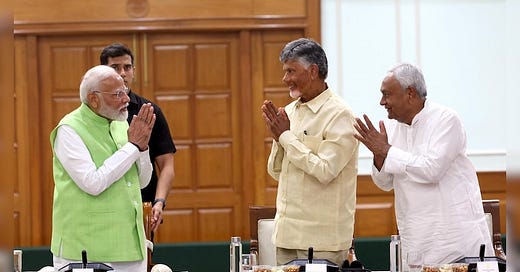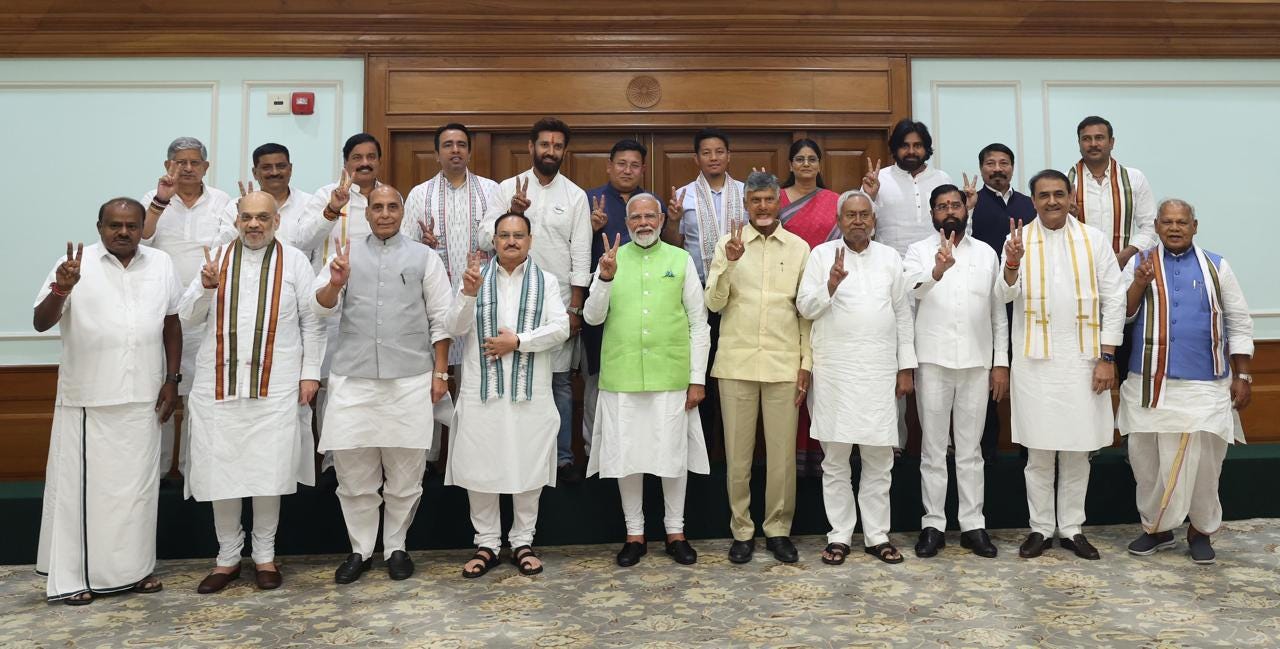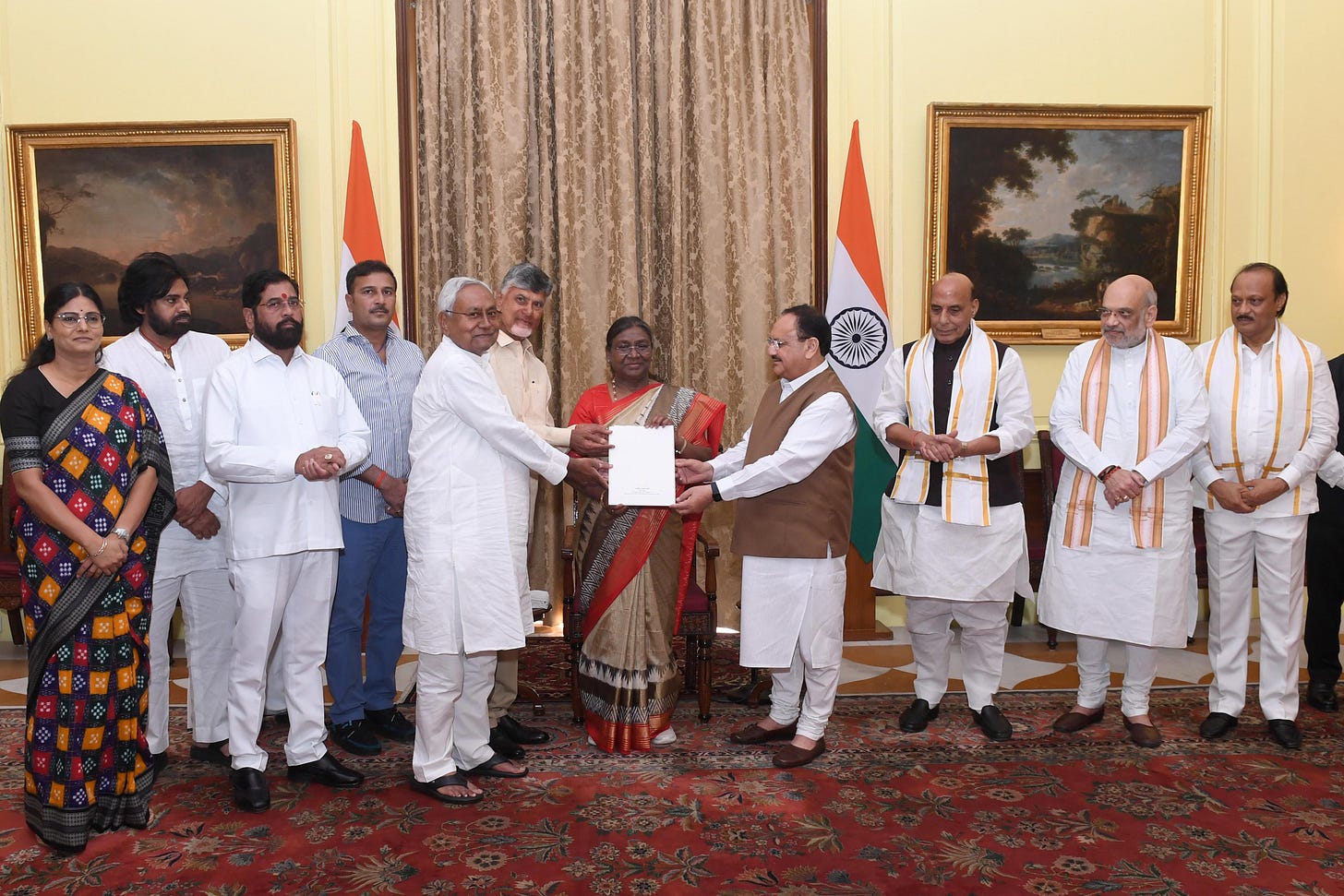Chandrababu Naidu Opts Out of Modi's Cabinet: Vies for Speaker's Post
Chandrababu Naidu: The Strategic Ally in Modi's NDA 3.0 Government, tough behind-the-scenes negotiations ongoing for the Lok Sabha Speaker's Post.
Chandrababu Naidu: A Strategic Ally in Modi's 3.0 Government
As the Modi 3.0 NDA government prepares to be sworn in on the evening of 9th June, 2024, at Rashtrapati Bhavan, New Delhi, it is being indicated that Chandrababu Naidu’s Telugu Desam Party (TDP) may refrain from joining the Union Cabinet. However, it would officially extend “unconditional” support to Narendra Modi’s NDA government from outside, while negotiating hard for the post of Speaker of the Lok Sabha behind the scenes. Among the key allies, N. Chandrababu Naidu, the astute leader of the TDP, stands out with his 16 crucial Lok Sabha MPs. Alongside Nitish Kumar of JD (U), who has 12 MPs, Naidu's support is indispensable for ensuring the Modi 3.0 government secures a stable majority. Despite the solid support of 240 BJP MPs, they still need the backing of these crucial allies to cross the magic midway figure of 272.
This decision brings multiple advantages for the wily Naidu. This article delves into his strategic manoeuvres, highlighting his expertise as a shrewd negotiator and his likely game plan in the evolving political scenario. Before we delve into this analysis, it would, however, be instructive to recapitulate his brief life sketch.
A Sketch of Chandrababu Naidu and Recent Triumphs
N. Chandrababu Naidu, popularly known as CBN, was born on April 20, 1950, in Naravaripalle, Andhra Pradesh. He began his political career with the Indian National Congress in 1978 before joining the Telugu Desam Party (TDP), founded by his father-in-law N. T. Rama Rao, in 1983. Naidu has served as the Chief Minister of Andhra Pradesh from 1995 to 2004 and from 2014 to 2019. He has been the National President of the TDP since 1995.
In the 2024 Andhra Pradesh Legislative Assembly elections, Naidu led the TDP to a significant victory, winning 135 out of 175 seats. The TDP's allies, Jana Sena Party (JSP) and BJP, won 21 and 8 seats respectively, giving their alliance a total of 164 seats. Naidu himself won from the Kuppam constituency. In the concurrent Lok Sabha elections, the TDP secured 16 out of 25 seats in Andhra Pradesh, with its NDA allies, BJP and JSP, winning 3 and 2 seats respectively, bringing the alliance's total to 21 seats.
Naidu's Strategic Positioning: Outside “Unconditional” Support
As mentioned before, Chandrababu Naidu may refrain from joining the Union Cabinet while supporting Narendra Modi’s NDA government "unconditionally" from outside. This, however, is subject to his party nominee being made the Speaker of the Lok Sabha. This approach offers multiple advantages for the wily Naidu, as we learn from the history of G.M.C. Balayogi, the TDP nominee who served as Speaker in the 1998 and 1999 Vajpayee coalition governments until his unfortunate death in a chopper crash in 2002. During that period too, Chandrababu did not formally join the government but extended outside support.
1. Position of the Speaker of the Lok Sabha
One significant advantage is the potential to secure the post of Speaker of the Lok Sabha. The Speaker plays a crucial role in matters of disqualification of Lok Sabha MPs under anti-defection laws and managing splits within the parliamentary party. This position would provide Naidu with significant influence over parliamentary proceedings and party dynamics, which becomes even more pronounced in the context of a coalition government. Additionally, unlike Cabinet Ministers, who serve at the pleasure of the Prime Minister, the Speaker, once elected, cannot be easily removed from office.
2. Avoiding Parallel Centre of Power
By keeping his MPs out of the Union Cabinet, Naidu ensures that none of them can emerge as a parallel centre of power with headquarters in New Delhi. This strategy helps maintain a unified command within the TDP, preventing any dilution of authority or internal conflicts that could arise from power struggles among his MPs.
3. Distancing from Contentious Decisions
Naidu's decision to support the government from outside allows him to distance himself from any contentious decisions made by the Union Cabinet. This avoids the moral hazard syndrome that would necessitate the resignation of his party ministers in the event of controversial policies or actions. This strategic distance provides Naidu with the flexibility to critique or support government decisions as per the political climate.
4. High Moral Ground
Occupying the high moral ground, Naidu can project his support for Modi's Government as a principled stance rather than a quest for power. This narrative bolsters his image as a leader who prioritises the welfare of the state and the country over personal or party gains, enhancing his political capital both within and outside Andhra Pradesh.
5. Avoiding Embarrassing Situations
By not having TDP representatives in the Union Cabinet, Naidu avoids potential embarrassment arising from any questionable decisions made by Union Ministers from his party. This safeguard protects his party’s reputation and shields it from the fallout of any ministerial controversies or missteps.
6. Leveraging for State Benefits
Supporting the NDA government from the outside places Naidu in a strong bargaining position to secure better deals for Andhra Pradesh. He can negotiate for special status for the state and seek substantial funds for the development of the new capital at Amaravati. This leverage is crucial for addressing the developmental needs of the state and fulfilling electoral promises.
7. Enhanced Negotiating Power
Lastly, Naidu’s external support enhances his negotiating power with the Central Government. Without being bound by cabinet responsibilities, he can move more freely, pushing for policies and projects that benefit his state and consolidating his political base in Andhra Pradesh.
Summing Up and Looking Forward
Chandrababu Naidu’s strategic choice to support the Modi 3.0 Government from the outside showcases his political acumen and adept negotiation skills. By positioning himself advantageously and potentially securing the crucial post of Speaker of the Lok Sabha for a trusted member of his party, Naidu not only strengthens his influence in national politics but also ensures substantial benefits for Andhra Pradesh. As a key ally, his manoeuvres will significantly impact the stability and direction of the Modi 3.0 Government, making him a pivotal figure in the unfolding political landscape.
If you believe this article would interest someone you know, please feel free to share it anonymously (for us), using any medium you prefer. Thank you for considering it!








ਜਿਸੁ ਹਥਿ ਜੋਰੁ ਕਰਿ ਵੇਖੈ ਸੋਇ।।